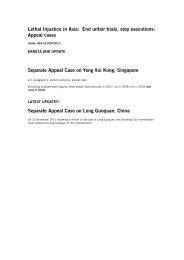read the report - Amnesty International
read the report - Amnesty International
read the report - Amnesty International
You also want an ePaper? Increase the reach of your titles
YUMPU automatically turns print PDFs into web optimized ePapers that Google loves.
NIGERIA<br />
‘WAITING FOR THE HANGMAN’<br />
37<br />
In May 2007, <strong>the</strong> Presidential Commission on Reform of <strong>the</strong> Administration of<br />
Justice (PCRAJ) reiterated <strong>the</strong> Study Group’s recommendation to adopt a moratorium.<br />
The PCRAJ concluded that “Limited legal protection, unequal access to justice<br />
perpetuate a situation in which <strong>the</strong> poor and o<strong>the</strong>r vulnerable groups are highly<br />
susceptible to arrest and subsequent imprisonment. It is <strong>the</strong> view of <strong>the</strong> Commission<br />
that this phenomenon, <strong>the</strong> criminalisation of poverty, should have no place in <strong>the</strong><br />
administration of justice in Nigeria.” Both <strong>the</strong> Study Group and <strong>the</strong> Presidential<br />
Commission highlighted <strong>the</strong> fact that inmates on death row are “almost exclusively<br />
poor and without legal representation.”<br />
The government has often admitted that reforms are needed in <strong>the</strong> criminal justice system;<br />
in 2004 a National Working Group on <strong>the</strong> Reform of <strong>the</strong> Criminal Justice Administration<br />
was established. 133 Despite this and <strong>the</strong> fact that President Obasanjo expressed his personal<br />
opposition to <strong>the</strong> death penalty on several occasions, <strong>the</strong> Federal Government took no<br />
action to adopt a moratorium. The death penalty remained on <strong>the</strong> statute books and courts<br />
continued to sentence people to death. Indeed, even more executions were carried out.<br />
Since May 1999, at least 410 people have been sentenced to death and at least 22<br />
executions carried out. 134<br />
By <strong>the</strong> time President Yar’Adua took power on 29 May 2007, none of <strong>the</strong> recommendations<br />
of <strong>the</strong> Study Group and <strong>the</strong> Presidential Commission had been implemented. President<br />
Yar’Adua’s government did not make clear its stand on <strong>the</strong> death penalty until November<br />
2007, when Nigeria voted against <strong>the</strong> UN General Assembly resolution 62/149 calling for a<br />
global moratorium on executions. 135 Senior officials at <strong>the</strong> Federal Ministry of Justice<br />
subsequently told <strong>Amnesty</strong> <strong>International</strong> “Death penalty is lawful. It is not a federal issue<br />
alone; it is a state issue as well. Once a governor signs an execution warrant, it is up to <strong>the</strong><br />
prison service to carry it out.” 136<br />
The death penalty has also been debated in <strong>the</strong> National Assembly: a bill to abolish<br />
<strong>the</strong> mandatory death penalty under <strong>the</strong> Robbery and Firearms Act 137 and replace it<br />
with life imprisonment was tabled before <strong>the</strong> House of Representatives in July 2008.<br />
Honourable Friday Itulah, one of <strong>the</strong> bill’s sponsors argued: “The incidence of crime is<br />
on <strong>the</strong> increase in Nigeria. The reason is that this act that came into force in 1984 has<br />
not succeeded in deterring at all. Ra<strong>the</strong>r than deterring criminals it has hardened <strong>the</strong>m<br />
and made <strong>the</strong>m ruthless.” 138<br />
A heated debate followed. One member speaking against <strong>the</strong> bill said: “It will be unfortunate<br />
for somebody to come and kill you and you should not kill that man.” Ano<strong>the</strong>r member<br />
contradicted: “We should be addressing <strong>the</strong> cause of crime and not <strong>the</strong> symptoms of<br />
crime… we should be looking at <strong>the</strong> economic situation of <strong>the</strong> country.”<br />
High levels of crime in Nigeria featured heavily in <strong>the</strong> debate. One member who spoke<br />
in favour of <strong>the</strong> bill said: “I understand <strong>the</strong> passion that this debate has generated…<br />
that is because armed robbery has become a day to day affair.” One member even<br />
suggested increasing <strong>the</strong> number of crimes resulting in capital punishment: “We have<br />
Index: AFR 44/020/2008 <strong>Amnesty</strong> <strong>International</strong> October 2008

















